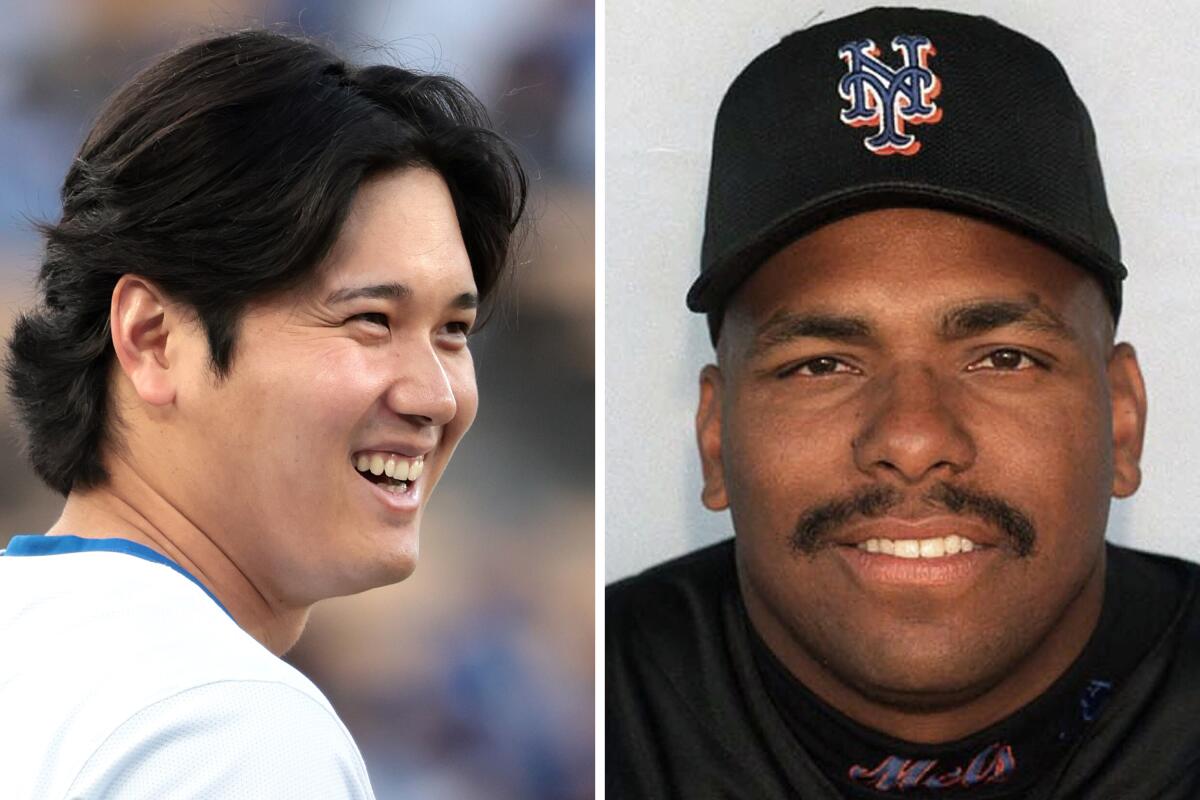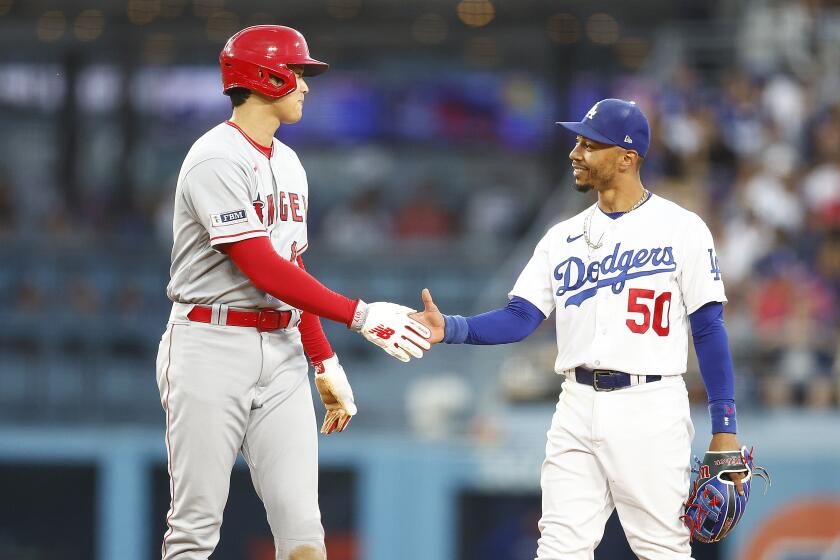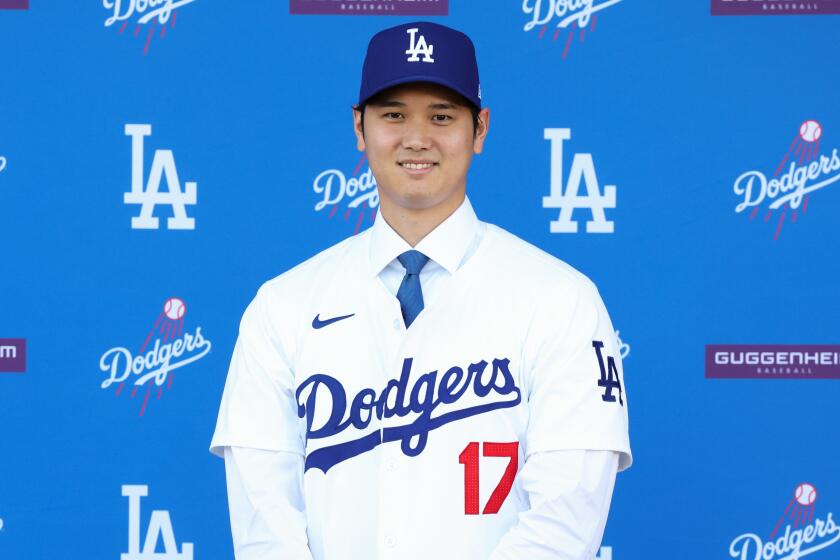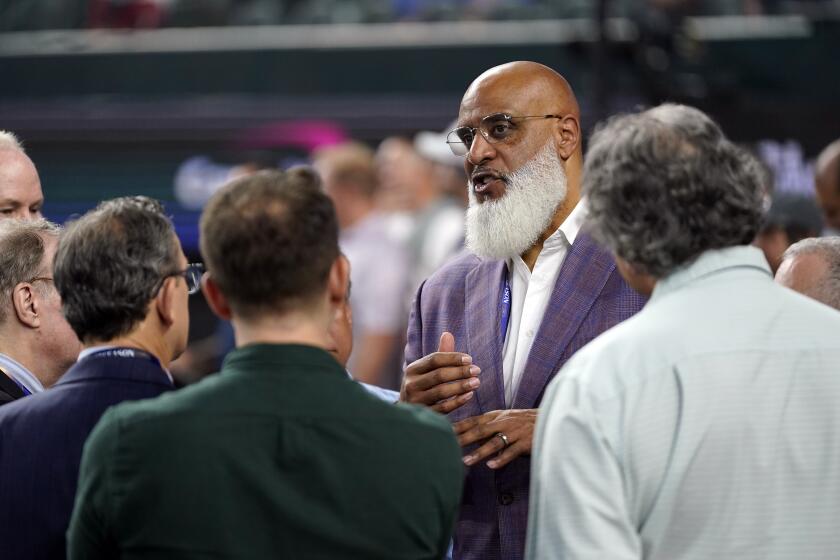Bobby Bonilla Day: How his deferred contracts compare to Shohei Ohtani’s deal

- Share via
We should all enjoy something like a Bobby Bonilla Day. But we don’t. Only one 61-year-old former ballplayer receives a payment of $1,193,248.20 from the New York Mets every July 1 through 2035.
Why? Deferred is the word.
It isn’t Shohei Ohtani money, but it’s something. The payments to Bonilla started in 2011, 10 years after he retired. He was a solid hitter, amassing 2,010 hits, 287 home runs and 30.2 wins above replacement during a 16-year career in which he played for seven teams, including a 72-game stint with the Dodgers in 1998.
But it was the Mets, for whom Bonilla played from 1992 to 1995 and again in 1999, who reached an agreement with him to defer his $5.9-million salary in 2000 and instead receive the yearly payments from 2011 to 2035.
Thanks to the extreme deferrals, the Dodgers won’t be paying Shohei Ohtani his full $700 million over the next 10 years. But, they also won’t be on the hook for only $20 million in that span.
Again, why? As in, why would the Mets agree to pay Bonilla more than four times what they owed him, albeit far in the future?
At the time, Mets owner Fred Wilpon had invested heavily with Bernie Madoff and was reaping annual gains of up to 15%. Turns out Madoff made off with $65 billion from nearly 5,000 investors and was sentenced to 150 years in prison. Wilpon, who would have turned a $49-million profit by 2035 on the $5.9 owed Bonilla in 2000 had he earned just 10% a year, lost a fortune.
From a baseball standpoint, the move was shrewd because the cash saved was used to sign Mike Hampton, Derek Bell and Todd Zeile, who helped the Mets to the National League pennant in 2000.
Roster-building considerations also prompted the Dodgers and Ohtani to agree to defer all but $2 million of his annual salary until after his 10-year, $700-million deal is completed. Ohtani will receive $68-million payments annually from 2034 to 2043, without interest.
California State Controller Malia Cohen says Congress should narrow the loophole that would allow Shohei Ohtani to avoid paying millions in taxes.
The structure was Ohtani’s idea, allowing the Dodgers to free payroll to sign more star players over the next decade. Shortly after Ohtani signed, the Dodgers reached agreements with free agent pitcher Yoshinobu Yamamoto (12 years, $325 million), free agent outfielder Teoscar Hernandez (one year, $23.5 million) and trade acquisition Tyler Glasnow (five years, $136.5-million contract extension).
The Dodgers, in fact, have made Bonilla’s yearly deferred income look like chump change. Mookie Betts has $115 million of $365 million deferred, Freddie Freeman has $57 million of $162 million deferred and Hernández has $8.5 million of $23.5 million deferred.
Deferring salary is generally not a sound financial strategy for a player because of inflation, according to the Major League Baseball Players Assn. The “net present value” of a contract — how much a deal with deferrals would be worth if paid out in the present day — is significantly lower than the guaranteed total. The net present value of Ohtani’s $700-million contract is only $437.5 million, and only $46 million currently counts toward the Dodgers’ luxury tax threshold.
Players union chief Tony Clark told The Times during spring training that he has no problem with players agreeing to defer salary.
MLBPA executive director has no issue with Shohei Ohtani’s contract with Dodgers, saying the union wants to protect the rights of players to pursue deferred deals.
“We offer them perspective. We offer them history,” Clark said. “We offer them any information to help them make the best decision they can themselves.”
Bonilla’s deferred money and annual payments from the Mets — which continue through his 72nd birthday — are part of that history.
So is a lesser-known fact: A separate deferred-contract from the Baltimore Orioles that began in 2004 pays Bonilla $500,000 a year through 2029, boosting his yearly income from deferred salary to $1,693,248.20.
More to Read
Go beyond the scoreboard
Get the latest on L.A.'s teams in the daily Sports Report newsletter.
You may occasionally receive promotional content from the Los Angeles Times.














